#when i feel more steadfast in portrayal
Explore tagged Tumblr posts
Text
Retreating onto my multimuse for now. Headspace isn't the best rn cause of IRL factors and dragon age seems safe rn to indulge in so... Will be playing dragon age and wrapping self up in my inquisitor OC stuff for time being.
#' ◁ ılı||ılı ▷ … ¹¹. 𝙾𝚞𝚝 𝙾𝚏 𝙱𝚊𝚝𝚜 🦇#anxiety flare ups are bad and am not handling them well#plus additional fears i am not good with bruce crept up again so retreating and will return#when i feel more steadfast in portrayal#if youd like to write together on there poke me in private and will share url
6 notes
·
View notes
Text
Junko: How patriarchy, time, and perception influence ( female ) friendships:
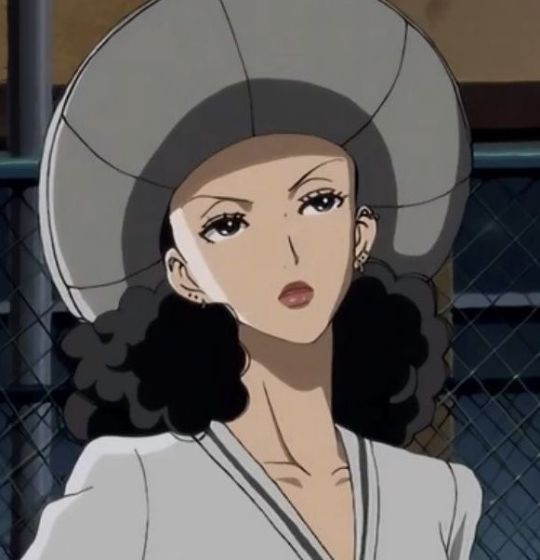
Junko is without a doubt a rather polarising figure within the Nana fandom. While some are inclined to view her as the epitome of a terrible friend, others find that there are aspects of her character that are not completely unreasonable. Some even argue that she is fully justified in her actions, interpreting them as a weary response to Nana Komatsu (Hachi’s) dependent and at times childish behaviour.
I personally find her to be an extremely intriguing case study on female friendships - it is rare to find a depiction of female friendships that deviates from the endlessly supportive, forgiving, and nurturing portrayals of female relationships. Often times women are not as forgiving and sweet to each other as is often idealised in popular media, with dynamics often being fraught with internalised misogyny, societal perceptions, past experiences, and unhealthy attachment - so it is refreshing to see such a realistic, unorthodox, and complex portrayal of relationships dynamics between women—an topic that is often underrepresented and undervalued, yet crucial in order for people of any age to reflect on their own friendships and the factors that shape their beliefs and behaviours within them.
Firstly, I think that there is no point in disputing that Junko, in her own, often unconventional way, cares about Hachi. Throughout the early episodes and chapters of Nana, Junko frequently steps in to protect and comfort Hachi when she thinks the situation calls for it. This can be seen when she immediately leaps into action when Hachi breaks down in tears, drunk and distraught over memories of Asano in Episode 2, calming her down. This concern is seen again when Junko berates Shoji for hurting Hachi’s feelings and leaving Hachi alone in an unfamiliar place before rushing out to go find her. When Junko learns that Hachi plans to move in with Nana Osaki, who was practically a stranger at the time, she tries to convince (scare) Hachi into reconsidering the decision, concerned with how Hachi would manage and what kind of person Nana would turn out to be. Accepting defeat when Hachi stayed steadfast in her decision, she challenged (Hachi’s words) Yasu, trying to support Hachi by passive aggressively asserting Hachi’s right to the apartment when Hachi failed to do so to her standards.
Infantilisation and stifling growth
However, Junko’s protectiveness often crosses the line into infantilisation, an action which is a mixture of both care for Hachi and an unconscious subscription to societal perceptions of ‘femininity’, which ends up doing more harm than good.
Ai Yazawa makes a point of emphasising that Junko has known Hachi for a long time - she is familiar with her romantic struggles and emotionally dependent tendencies. But Yazawa also shows us from the start as well that Junko is immalleable. She is a character that does not bend to displays of emotion or whims - a foil to Hachi’s very passionate and dreamy personality. It becomes apparent from their interactions that Junko, after having been around Hachi a long time, internalised how Hachi behaves and acts to the point where she sees these traits as innate to Hachi as opposed to behaviours that have developed and formed over time. This strongly held perception of Hachi becomes a problem, as instead of encouraging growth ( which is what every healthy friendship accepts and promotes), Junko reinforces these observed traits, often treating Hachi as if she were a younger sibling or even a child. She seems “relieved” when someone else is there to “take care” of Hachi and even makes decisions on her behalf, such as revealing Hachi’s crush on Shoji despite Hachi making a conscious decision to not be romantically involved in anyone, assuming that Hachi does not have the scope to actually achieve the emotional goals she sets for herself.
This dynamic consequently stifles and hinders Hachi’s ability to grow as an independent person throughout the anime, as Junko continues to see her through the lens of their shared past rather than as a peer. Even when Junko chastises Hachi for her lack of independence, she paradoxically expresses relief when someone else can ‘step in’ to care for her. This cycle of infantilisation keeps Hachi trapped in a dependent role within her friendships, and Junko’s inability to adjust her perception only reinforces these traits in Hachi. How people around you perceive and treat you influence how you subconsciously view yourself, and in Hachi’s case, she would see herself through Junko’s eyes as exasperating and hopelessly dependent. While Junko could very well believe her treatment stems from a deep and intimate understanding of Hachi, she in fact implies, most likely unintentionally, that Hachi is not capable of better. Junko's habit of infantilising Hachi repeatedly yet chastising her for the very thing Junko validates puts her in an endless pattern of being enabled, but not giving the genuine support when she does attempt to break the cycle.
Internalised misogyny and and complicity to the status quo
At the root of Junko’s behaviour there is a subtle form of internalised misogyny that permeates throughout her interactions with Hachi. Hachi’s personality is characterised by dreaminess, emotionality, and dependence, and aligns with traditionally "feminine" traits that patriarchal societies often devalue. She is romantic, frivolous and dependent, and Junko, in contrast, is portrayed to be and see herself as more pragmatic and career-oriented, which she is shown to be aware of and even proud of in the anime and manga. She firmly corrects Hachi when Hachi hopes she will give up on her dreams of art school in Tokyo, and pursues her passions and career with dedication throughout the anime. Her more modern lifestyle ( living unmarried with her boyfriend and striving for her dream career) contrast heavily with her more conservative mindset with gender - through interactions between Hachi and Junko, we can see that she seems to have adopted a more ‘masculine’ role between the two of them, acting as the voice of reason and logic, traits which are stereotypically associated with masculinity ( haha). You can see that this patriarchal compartmentalisation of personality traits is something that Junko had internalised growing up through her interactions with Hachi, perceiving Hachi as hopeless and in need due to her personality, when in actuality we find out later that Hachi is perfectly capable of making decisions herself, and managing difficulty by herself (with more resilience that others can muster). While she surely does not always make the best options, she is able to adapt and persevere - not exactly the actions of a hopelessly dependent person.
This is a greatly nuanced decision on Yazawa’s front, as she perfectly depicts how growing up in a patriarchal society does not only influence male and female relations, but all - due to Junko growing up in a patriarchal society where women with ‘feminine’ traits are simultaneously taken care of and condescended, she too mimics and appropriates such beliefs and actions. The status quo in such societies ( like Japan in the time the manga is set) are rigidly upheld yet at the same time result in the mocking and contempt of women who adhere to or fit the mould shaped and maintained by the same people who patronise them - and often times women are complicit in upholding harmful patriarchal ideals. I think this is a refreshing (and depressingly realistic) depiction of relationships between women, as it perfectly captures the delicate and painful cognitive dissonance between caring for someone and not doing what is in their best interest due to internalised misogyny.
A large aspect of internalised misogyny is putting male approval and attention on a pedestal, and Junko depicts such influences as well when she compares her love life to Hachi’s. She flaunts her alleged ability to form platonic male friendships without becoming romantically involved, ironically right before quickly entering into a relationship with Kyosuke. Junko then feels the need to justify her own quick decision of sleeping with and getting with Kyosuke to Hachi, showing a unconscious adherence to the notion that as a woman, getting with or attached to a relatively unknown man simply because of a desire to is a disdainful trait, and one that Junko makes a conscious effort to differentiate herself from - and not for Hachi. Hachi did not judge or even understand why Junko made such a fuss explaining; Junko’s attempts were more a form of self reassurance that she is not like the ‘others’ who are deemed undesirable and whorish ( a belief she holds due to her close interaction with patriarchy growing up). Junko is in fact not so different from Hachi, from what we can see from her actions in the anime and manga. We are told by her she does not attach herself romantically to men quickly, yet in the first instance possible we see otherwise. We see her look down on Hachi’s air-headed desire for a stereotypical, domestic relationship with a reliable man, while staying with Kyosuke throughout all the anime and manga, using him as a mode of support and guidance as well as a romantic and seemingly life partner. Her contempt of Hachi at times seems to be a reflection of her own insecurities with the aspects of her personality that do not fit the mould she wants - the aspects of her personality she was raised to see as less valuable and worthy and therefore grew up and internalised.
Junko’s internalised misogyny is also apparent in her loyalty to the men in her life, particularly in her defence of Shoji after he cheats on Hachi. Instead of holding Shoji accountable, Junko places the blame on Hachi, telling her that it was her fault for being too dependent, too self absorbed - too absent ( the very traits she was telling Hachi to adopt). This reaction reflects Junko’s struggle to justify her friendship with Shoji through her own internalised belief that women are responsible for men’s behaviour ( a common belief in patriarchal societies to take accountability away from men, instead vindicating and blaming the women involved). This scene serves to reveal Junko’s desire to preserve her own relationships and avoid conflict with male peers - by justifying Shoji’s actions, she maintains the comfort and security of her social circle, which includes her boyfriend Kyosuke, who is also Shoji’s best friend ( again rather similar to Hachi and her want of companionship) - she puts her male centred relationships on a pedestal at the expense of her female friendships and Hachi’s wellbeing.
Junko’s character serves as a window into the nuanced ways internalised misogyny, perception, and shared history can influence female friendships. Her dynamic with Hachi is shaped by her rigid perception of Hachi’s weaknesses and her own internalised biases about what traits are "acceptable" in women. While Junko is portrayed as a capable, independent woman—someone Hachi and other women can in some ways even looks up to—her patronising attitude ultimately undermines the potential of their relationship. Junko’s failure to see Hachi as an evolving, autonomous person perpetuates a cycle of dependence, preventing both women from growing as individuals and as friends, with Junko feeling equally responsible and burdened by Hachi but not allowing the relationship to develop beyond how it was in the past.
By portraying Junko, one of Hachi’s closest friends, as such a complex, multidimensional character, Ai Yazawa offers a compelling critique of the ways in which societal norms and internalised beliefs can distort relationships between women, and bring attention to topic that is often neglected yet experienced and lived by women universally. Junko’s story illustrates that it is not only overt sexism that influences women’s lives but also the more subtle, internalised forms of misogyny that shape how women perceive themselves and each other, and the pitfalls of relationships that remain stagnant in the past instead of allowing both parties to grow and flourish.
#nana osaki#manga nana#nana komatsu#nana anime#nana#nana and hachi#anime analysis#anime#anime and manga#manga analysis#manga#nana manga#nana hachi#hachi#hachiko#ai yazawa#ren honjo#takumi#junko saotome#media analysis#media literacy#character analysis#anime gif
195 notes
·
View notes
Text
Something I love about One Piece is the portrayal of relationships that are important and intimate without the use or need of romance and sex. Take Zoro and Luffy for example, while there very well could be attraction (romantic or otherwise) it's not their entire relationship. Oda clearly let's the reder know that they have a strong relationship, and they are very important to one another. Some instances of this being during Zoro's fight with Mihawk at the Baratie, when he said Luffy would be disappointed if he lost, and he didn't want to bring shame to Luffy, and swore loyalty to him. Or that one instance during the long ring long land arc when Zoro made an offhand comment about how he doesn't have any reason to be a pirate if Luffy isn't his captain, and don't even get me started on the Thriller Bark Zoro vs. Kuma scene where Zoro offers Kuma his own head in exchange for Luffy's life, telling us, the viewer, that he sees his captain as more important than his own dream. It's unmistakably obvious they love each other, and Zoro shows it through his loyalty to his captain. Luffy on the other hand shows his love for Zoro in a different manner, where Zoro's steadfast loyalty to his captain, Luffy's way of showing his love to Zoro is how much trust he places in him. Whether it be in a fight, knowing that Zoro can hold his own, like in that one scene from the wano arc when Luffy asks Zoro to fight while he takes a nap. Or during the waters 7 arc when usopp challenges Luffy, and while the whole crew is wavering because of Luffy's decision, he feels like the crew is falling apart. Zoro is the anchor that is holding Luffy to a standard as captain, and Luffy trusts his judgment wholeheartedly, because he knows that Zoro only has his best interest in mind.
#one piece#roronoa zoro#monkey d luffy#zolu#there's a reason the greeks had six different words for different types of love#zoro is so loyal to luffy i can't#luffy trusts zoro more than anyone else istg
218 notes
·
View notes
Text
I need to preface this post with the fact that I’ve been aware of Supernatural for as long as I’ve known what the terms fanfiction and fandom mean. It’s one of those pop culture moments that’s existed on the periphery of my mind as something really beloved and bemoaned about by people on the internet, but it’s never been something I really cared about outside of some iconic memes.
For the past four days, I’ve been watching Supernatural non-stop in my free time. I think I sat through eight episodes straight on one of those days, and I just have to say, the show is phenomenal.
I don’t know where to start, I could make a dozen of these posts about various points throughout the first two seasons and it still wouldn’t be enough. I’ve now taken a break at episode one of season three, because now that it’s a weekday I have work and can’t dedicate the time I could on the weekend.
First, Jared Padalecki’s acting is so beautiful and poignant and emotional. He really makes Sam Winchester into the bleeding heart of the whole show, and the entire time he’s on screen I worry about Sam. His portrayal of Sam’s heartbreak and desperation at Dean’s impending death after the car crash, as well as Sam’s horror at the reveal of what John told Dean before dying held a tragic desperation and denial that really embodied what the character represented in the first two seasons. Even as a hunter and with his special abilities, Sam felt like a quasi self-insert for the audience. I don’t mean that in a bad or overly tropey way, but in the way that he felt robbed of a proper childhood in favor of his father’s crusade. Sam is the angry, indignant younger sibling who never bore the brunt of responsibility like the older sibling did and it shows. In some ways, it makes him more entitled—I don’t mean that Sam does not have the right to be angry with John Winchester. He does. Fuck John Winchester. I mean entitled in the unintentional, coincidental way that your little brother or sister always demands the things you never had or rebels against the authority of the parent without ever dealing with the consequences you did as the older sibling. It reveals the veneer of freedom he had and the protection he received by virtue of his place in the Winchester Family. For me, it made him unbearably real, and this feeling of realness was made worse by the genuine naivety and innocence he keeps even as he continually gets screwed over by the demons. There’s a steadfast belief in the goodness of others within Sam that often conflicts with the sense of goodness he believes he lacks.
Sam trusts so easily, but he understands people in ways that should be antithetical to his upbringing. It took me forever to reconcile why he seemed so familiar, until I realized that Sam Winchester, for all that he was one of John Winchester’s son, had received the unconditional love of an older sibling for his entire childhood.
I don’t mean the perfect, kind, healthy love that often exists between fictional siblings. Too often I’ve watched media that makes me wonder how siblings like that even exist, or conversely, made me glad my siblings weren’t so fucked up.
I mean the kind of platonic love that exists between siblings living in the liminal space of love and hate thanks to the single fucked up connection that draws them back together continuously out of some sense of duty or commiseration or the need to be understood.
I mean the kind of love between siblings that would wither away when in a perfect world that does not stake their survival on their codependence of each other, but that in an imperfect and real world is equated to familiarity. Sam and Dean against the world—against John Winchester.
Out of all of the episodes I’ve watched in the last day and a half, perhaps the one that struck me most was episode 20, Season 2. What is and What Should Never Be. Not only was the title a bit of emotional whiplash—the juxtaposition of Should and Never lending a finality or a sense of wrongness that can’t be replicated by the words “Could Never—but we see Dean and Sam in a world where their one connection, hunting, has completely vanished and at a high cost to all the people they’ve saved, but mostly to Sam and Dean themselves. They’re connection as ride or die brothers is gone, replaced by an ostensibly better, healthier, more normal future liberated from the expectations of the rest of the world.
Without the death of Mary Winchester, Dean and Sam are no longer Dean and Sam. They’re just two people, connected by the two people that raised them, and likely to drift apart after that connection dies—frayed ends of a tapestry pulling apart and unraveling. Dean gains a mom and a normal life, but metaphorically loses a brother and a sense of purpose. Who is Dean Winchester if he’s not a hunter and Sam’s brother? And the sad thing is, neither of these are traits Dean ever chose. They are conditions foisted upon him, perhaps not intentionally, such as in the case of Sam, but ultimately placed on his soul until they tethered themselves to the very core of what being Dean Winchester is supposed to mean. The end of the episode, and Dean’s choice to return to the real world, regardless of Sam waking him up, is Dean fully giving up his dream in order to save Sam and be a hunter. The fallacy of the episode is in the choice Dean makes, which the more I think about it, feels less like a choice and more of an inevitability but one compounded by Dean’s readiness and willingness to go with it.
This is where I get to the crux of my surprise with these first early seasons of Supernatural: Dean Motherfucking Winchester.
I don’t know what I was expecting from early seasons of Supernatural, especially with the context of the later seasons. Maybe an overly cheesy, early 2000s ode to roadtrip Americana with a self-reverential take on the classic gun slinging frontiersman of the Wild West and bad supernatural CGI. Not to say it isn’t that (shout out to Sam’s comment on Dean’s particular brand of butch), but what surprised me was how real the connection between the characters was manifested on screen and how much good will the show built up in the audience. There came a point where I sided with Dean so much in the events of the show that I felt like I was riding shotgun in the impala. I saw it with every compliant “yes, sir” he gave to John, with every teasing comment he threw at Sam, and with every act of selflessness he exhibited by protecting other people. This isn’t to say that Dean is perfect. Sometimes he doesn’t take things seriously enough, or he’s willing to sacrifice people for some misguided greater good, or he’s obsessed with saving Sam even when he wouldn’t be if it were anyone else, but Dean has a conviction so many people lack. He has the capacity to love at a great cost to himself, either because he believes himself unworthy of being loved or because he’s not used to anything else.
Jensen Ackles does such a good job at this portrayal and with such a different technique than Jared Padalecki. Ackles embodies the desperate need for self-assuredness that Dean breathes, as well as the genuine fear he has of being seen. I love laughing with Dean as much as I love screaming at him for how stupid he’s being. If Sam is the self-insert, then Dean is the tragic hero, although that comparison feels like a poor facsimile for what Dean Winchester truly is because I don’t particularly feel an overwhelming sense of pity at his state or at his hinted downfall with that demon deal. If anything, I feel a sense of indignation mixed with understanding and frustration that Dean can’t catch a break but at the end of it all, is just how he prefers it.
It shouldn’t be a shock to admit that even without knowing what happens from seasons 3 to 15, I know how Supernatural ends. Just thinking about the ending makes me wonder if I should even continue it past season 5, but that’s a decision for another time.
For now, there’s something unbearably tragic in seeing Dean Winchester so close to a chance of a normal life and apple pie happiness (something he really seems to desire no matter how much he denies it) and then having to give it up, not just because it’s not real, but because he believes it should never be real.
Dean Winchester deserves better.
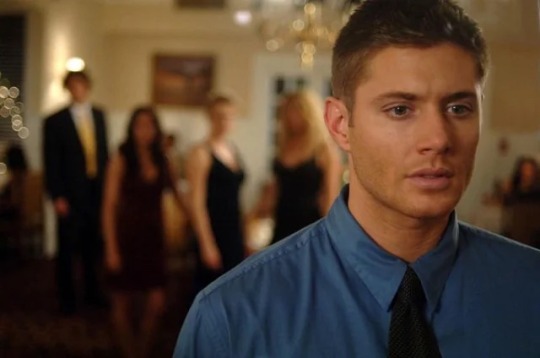
#supernatural#dean winchester#sam winchester#supernatural season 1#supernatural season 2#supernatural season 3#dean winchester deserved better#dean winchester deserves better#sam and dean#jensen ackles#jared padalecki#character study
232 notes
·
View notes
Text
Unwavering Faith: Aveline and the Colonial Assassins (Analysis)

Over the years, I've come to notice a dual parallel and theme between the premise of AC Rogue and the side title, Liberation:
The loss of faith. Despite its intentionally ambiguous portrayal of the Assassins, Liberation compellingly explores their flaws, contradictions, and hidden layers through characters like Agate and François Mackandal respectively. This, in turn, profoundly impacts Aveline's mental state and her faith in her sect of the Colonial Assassins and their Creed.
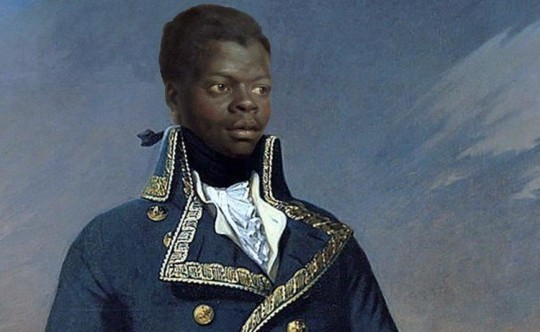
Mackendal, in particular, was a very fascinating character not just in the historical context, but in what he encompassed for the ideals and values of the Assassins when pressed to their logical extreme in using their Creed as a policy for aggression, violence, and unrestrained use of power. An example of this is how he aimed to poison the colonists in Saint-Dominique.
The Mackandal Rebellion (1750-1758) | Haitian Revolution (1791-1804)
What's interesting is that despite his atrocities, Mackandal didn't think he was a traitor of any kind to the Brotherhood or what it preached. Much Like Altair who didn't believe so when he killed his Mentor. Neither did Pierre Bellec when he killed Mirabeau in Unity. Mackandal, in fact, firmly believed he was an Assassin, even truer than the Colonials themselves. From his perspective, he didn't kill "innocents." He just didn't see any of the "white masters" at the time as remotely innocent. Clearly, he was wrong from any other point of view, but it doesn't make him less of an Assassin. After all, the Creed does allow it if you want it to.

In some regards, he shares a sharp contrast with Adewale himself. Both men are shaped by their brutal experiences as slaves, embodying contrasting conclusions with the Assassin's Creed. Mackandal, corrupted by deep-seated anger, employs ruthless and indiscriminate methods such as poisonings, reflecting a radical approach that often causes collateral damage that ultimately catches up to him destroying himself and his Brotherhood. In contrast, Adewale, motivated by a strong sense of justice and compassion, remains steadfast in his convictions and humanity for himself and others. As a result, Mackandal's legacy is often treated as a cautionary tale, while Adewale retaining his morals and principles through the Creed is still remembered and admired by even individuals like Evie Frye an entire century later. This duality between them underscores the larger internal struggle that individuals within the Brotherhood face in response to both oppression and their endless fight for and to preserve freedom. This era of the Assassins, especially, is faced with this dilemma where the very freedom that they fight for is often short-lived, imperfect, nuanced, and bittersweet. 'Laid to Rest' Transcript

Connor: "My father is dead. Charles Lee now leads the Templar Order in his place. I see now why ours is an eternal war. For each piece taken from the board, another is placed upon it. Back and forth we go. Across the world. Across the ages. Some days, mine feels an impossible task, but I cannot afford to be consumed with doubt. The people need me. Now, more than ever. I must stop the Templars. I will kill Charles Lee." Connor's Forsaken Epilogue Soliloquy Connor: "So many voices, each demanding something else… It has been hard at times, but never harder than today to see all I worked for; perverted, discarded, forgotten!"
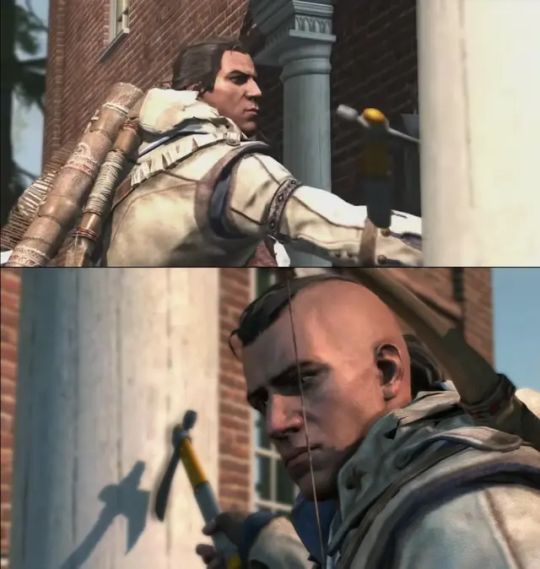
This brings us to the inner turmoil and duality that Aveline struggles with over the course of her story. Who is she really? Why does she fight? Is it even worth the effort to fight at all in such an unjust world?
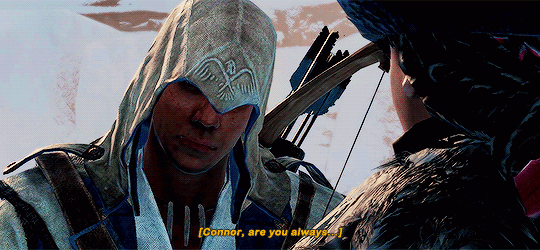
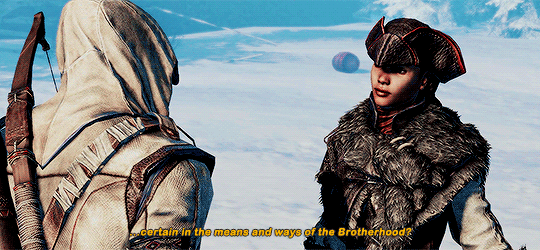
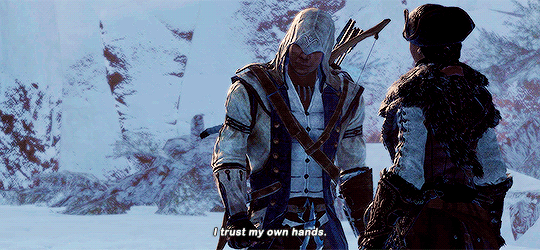
"I trust my own hands," I believe, is Connor expressing his adherence to individualism above all else. For him, it signifies the realization that even the people and institutions you serve can be flawed or have misguided intentions, and you must trust your own judgment. This mindset makes Connor an embodiment of the Creed and its ideals—an approach that Aveline also adopts. Her persistent fight for choice and freedom, despite the hypocrisy, corruption, and fallibility within her own order, makes her dedication as an Assassin truly compelling. Because Aveline is more than just an Assassin. She is a liberator.
#assassin's creed#connor kenway#ratonhnhaké:ton#adewale#assassin's creed 4#ac liberation#aveline de grandpre#francois mackendal#achilles davenport#assassin's creed rogue#shay patrick cormac#seriously the colonial era was super interesting for both groups#Aveline deserves some appreciation too y'all#Her arc is seriously underrated
36 notes
·
View notes
Text
Thoughts on Halsin 🍁❤️
(Note: I love seeing conversations about him and the diverse portrayal of intimacy from this game... also before we begin - Open, Poly and non cis het 1:1 love is totally valid and beautiful.)
✨✨✨✨✨✨
Having lived for over 350 years, Halsin has likely experienced profound grief and loss as generations of friends, partners, and family members have grown old and died over the centuries while he remains youthful.
This amount of cumulative grief can take a psychological toll, potentially leading to fatigue or even trauma related to the continual cycle of forming attachments and then losing those he cares for.
:readmore:
To cope with this, Halsin may have adapted by taking an approach of limiting intimacy and avoiding deep romantic commitment to any one individual.
The openness to polyamorous relationships could be a way to maintain connections and intimacy, while also protecting himself emotionally by not relying solely on one partner.
This can be an understandable coping mechanism when facing near-immortal longevity combined with human frailty.
However, avoiding deep romantic bonds over centuries may also leave Halsin feeling empty and disconnected. Watching loved ones slip away could compound a sense of isolation and existential loneliness.
While his adaptable approach allows him to carry on, Halsin may harbor deep grief that cannot fully be resolved while remaining eternally youthful among mortals. Finding meaning and purpose beyond individual relationships could be important for Halsin's continued growth and fulfillment.
While polyamory can be a valid approach for some, after centuries of loss, Halsin may still long for the stability and comfort of a lasting partnership. Jumping from lover to lover without allowing deeper roots to form may leave him feeling unmoored.
Having witnessed so much change over the decades, the promise of a steadfast companion can be appealing despite the risks. Part of Halsin may yearn for the chance to build a life and a home with someone by his side for however long their years allow. A singular devoted partnership cannot be replaced entirely.
Though he may have adopted polyamory as a protective strategy, facing grief and change eternally as an immortal being may also cause Halsin to wish for an anchor - someone true who will stand by him through whatever may come, even if only for a limited mortal lifespan.
Also, While part of Halsin may long for lasting stability and commitment, polyamorous relationships can still nurture him and provide affection. Not every connection must be so profound as to leave him utterly devastated when it ends. There is merit in more casual intimacies that sustain him for a time without demanding his whole self.
Polyamory allows Halsin to share varied experiences with diverse partners, making the most of his extensive lifespan. He need not limit himself to one sole companion when there are so many uniquely beautiful souls to appreciate over the centuries. In this way, polyamorous arrangements allow Halsin to explore love widely without the complete anguish of losing a singular life partner.
While some relationships may run deeper than others, he can still cultivate care and support through his chosen loves and community. With openness and communication, polyamory provides fulfillment and respite from loneliness as he continues navigating immortal life. For Halsin, it may be a delicate balance - letting himself enjoy connection while remaining guarded enough to endure love’s losses.
Just love him 😻
💖💖💖💖💖
41 notes
·
View notes
Text
I think this is also worth sharing. Another interview with Woo Davi, our lovely Jooran. And I'm going to bold my favorite in this interview and input comments enclosed with '<>'🤭

Woo Davi on Jeongnyeon: "Subtle emotional scenes with Kim Taeri... I actually fell for her" [IS Interview]
"I felt a surge of emotions when the 'Twin Towers' stage ended."
Actress Woo Davi gained recognition through the tvN drama Jeongnyeon. She portrayed Jooran, a friend of the protagonist Jeongnyeon, bringing depth and dimension to the character while also charming audiences with her role as Gu-seul A-gi on the women’s national theater stage.
In a recent interview with Ilgan Sports, Woo Davi shared, "I felt sad after the final scene featuring the 'Twin Towers' stage in the last episode of Jeongnyeon. It felt like a farewell I wasn’t ready for, as though I was parting with Jeongnyeon. I’d never experienced such emotions in my life before. Everyone gave their all, and for me, it was a series of challenges." <same, davi, same.>
Jeongnyeon, based on a webtoon of the same name, is set in the post-Korean War 1950s and tells the story of Jeongnyeon (played by Kim Taeri), a girl with an extraordinary singing talent, and her journey in a women's national theater troupe. The drama premiered on October 12 with a 4.8% nationwide viewer rating (according to Nielsen Korea) and concluded on November 17 with a remarkable 16.5% rating.
Woo Davi played Hong Jooran, a trainee in the Maeran Theater Troupe who stood out as the only character to warmly support Jeongnyeon when others were envious of her genius. While the original webtoon depicted Jooran as simply Jeongnyeon’s friend, the drama expanded her role to significantly influence Jeongnyeon’s transformation. Woo Davi delivered a multi-faceted performance, portraying innocence in their friendship, the confusion of a young girl feeling subtle emotions for Jeongnyeon, and the eventual struggles of a woman swept up by the times. Her nuanced portrayal contributed to the drama being praised as a well-crafted piece. <thank you for recognizing 🥰>
During the interview, Woo Davi, who showed a personality more assertive than her character Jooran, expressed deep affection for her role. “Jooran is steadfast and kindhearted, always approaching others with an open mind. She boldly shares her thoughts, even with the genius Jeongnyeon and the distant Yeong-seo (played by Shin Ye-eun). Despite being 18 in the story, her ability to stay grounded in challenging circumstances was admirable,” she said. However, she added with a laugh, “In real life, I tend to say what’s on my mind right away because I don’t want to have regrets. Watching Jooran hesitate to admit her mistakes to Jeongnyeon made me think, ‘You should just say it!’” <i wonder if davi would've confessed to jeongnyeon aside from admitting her mistake trying to run away/refusing to admit her true feelings 🤭 because the way i interpreted jooran's action was it's because of her confused feelings for jeongnyeon and it scares her because maybe she couldn't understand it at first as to why she's having such feelings for her. so if davi happens to be in the same situation i wonder if she'd say to jeongnyeon right away: "i'm scared to be your partner because you make me feel things i've never felt before. my heart went crazy when i practiced and it got me confused idk if it's just acting or not anymore.">
Jeongnyeon centered on Jeongnyeon’s coming-of-age story, but the drama also focused on the dynamics between its characters, showcasing significant changes in their relationships. Woo Davi explained, “Jooran has many sides to her. She’s angelic at times and cold at others. I worked hard to portray these contrasts while maintaining her core identity.” Regarding the pivotal scene where Jooran witnesses Jeongnyeon losing her voice, Woo Davi shared, “I wanted to capture the subtle nuances in that moment.” In that scene, Jooran develops emotions that seem to transcend friendship while rehearsing the role of Gomigeol in Jamyeonggo opposite Jeongnyeon, played by Kim Taeri.
“There’s no doubt that Jooran felt something deeper than friendship for Jeongnyeon. Since both characters love the stage, it made sense for their emotions to intertwine with their Jamyeonggo roles. I read comments on that scene, and one said, ‘Who wouldn’t fall for Kim Taeri if she looks at you like that?’ and I completely agreed. (Laughs) Taeri’s gaze has a way of drawing you in. I actually fell for her in real life during that scene. The atmosphere on set was so intense that you could hear every breath, but Tae-ri unnie led the scene so naturally that acting in it wasn't so difficult. Unnie is so full of passion that I just had to follow her energy in every scene. I feel lucky and honored to have worked with her." <when davi said "i actually fell for her in real life" seems like taeri and davi have become the real versions of jeongnyeon and jooran 🤭 because it's that same scene where jooran's (dormant) feelings for jeongnyeon awakened, and that same scene also made davi fell in love with taeri. but without going beyond, davi's transparent admiration for taeri is so cute, and perhaps this already answers my question if davi happens to be jooran she had already confessed to jeongnyeon with how davi boldly declares that she fell in love with taeri during the same scene. and the last sentence really warms my heart "i feel lucky and honored to have worked with her". i'm so happy for woo davi for getting that role, giving her a chance of once in a lifetime to work with the actress she admires and really winning for she got to also be the love interest of kim taeri~~>
Woo Davi also captivated viewers with her role as Gu-seul A-gi in Jamyeonggo. Her princess-like appearance and aura immediately drew attention. The interplay between Jooran and Jeongnyeon, both portraying Gu-seul A-gi, added an extra layer of fun. Reflecting on her performance, Woo Davi said, “I was nervous watching the scene, but I was relieved to see nothing seemed off. Later, when I read viewers’ comments, they were so overwhelmingly positive that I joked about the company hiring people to write them. It was an honor to be associated with such kind words and to receive so much praise.” <you deserve all the praises because you did a splendid job, davi 🥰 both you and taeri. also, thank you for your hardwork and for bravely auditioning for jeongnyeon: the star is born despite it having a subtle gay theme (as a rookie actor it's really brave. but same with kim taeri, when she's also just starting, she bravely starred in the handmaiden which is more explicit). and i hope that you'll be more confident in your craft. but i understand the nervousness especially that scene screams *gay* because sadly s.korea isn't still so open. so for it to receive such positive comments is really a surprise and must be very rewarding. but it's great that they dared to air a drama with same-sex intimacy for general audiences even though the director had been cautious and have deleted some scenes (*the needed kissing scenes**gay fights*) that can really confirm jooran and jeongnyeon's feelings for each other.>
Like her fellow cast members, Woo Davi trained in women’s national theater techniques for a year before filming. She admitted, “At first, it felt so foreign and challenging that I was often discouraged, wondering if I’d ever improve. The process was also about accepting my own shortcomings and growing through them.”
Since her debut in the 2019 web drama Triple Some 2, Woo Davi has steadily built her career through supporting roles in various projects. Jeongnyeon marked a turning point in her career, firmly establishing her presence among viewers. “Even though the drama has ended, I’m still thinking about how I can showcase more diverse aspects of myself,” she shared. To her fans, she said, “Thank you for all the love you’ve shown. I promise to repay your support with even better performances.” <i'm looking forward. and if i'm going to be honest, i want more of davi and taeri gl series. and also, i don't think i'm ready yet to see davi be partnered up with a guy. though i know she already starred in a drama wherein, obviously, she's partnered up with a guy. i know i'm being petty. but it's the same with taeri. after watching the handmaiden, i found that it's hard for me to watch taeri being intimate and locking lips with a guy. *i think i have a heterophobic percentage lmao*)>
— Jihee Yoo, reporter at Edaily
Link: https://m.entertain.naver.com/article/241/0003398062
#thank you for taking the time read#woo davi#interview#jeongnyeon: the star is born#jeongnyeon the star is born#jeongnyeon#jooran#jeongnyeon x jooran#jeongran#text#*jj
3 notes
·
View notes
Note
noticed that you were a benedict fan!!!! thoughts about bridgerton season three part two???? i seriously cant wait until the two weeks are over!!!

Genuinely, I love this!! Thank you so much for putting this into my ask box - finally, an excuse to talk about my hoe boy Benedict!!
So! Far context regarding Bridgerton, I want to preface that I have not read the books. I have skimmed parts of them through TikTok or on tumblr, but otherwise I haven't touched them. I have seen every season thus far, including the spinoff Queen Charlotte. Here's a brief summary of my thoughts on each season:
Season 1: started off strong, but I didn't like how Daphne/Simon's relationship was portrayed. I didn't like how Daphne basically assaulted Simon and it was never brought up again. I enjoy the first half with all of the longing, but when it got to that scene and what follows, I just really struggle with it.
Season 2: glorious, amazing, spell-binding, never been done before - all I ever wanted and more. Enemies to lovers is one of my favorite tropes ever (clearly), and Anthony and Kate's chemistry was through the roof. I absolutely adored the storytelling this season and the mutual longing between them and the TENSION. I was also very pleased by how the show portrayed vulnerability and trauma in a male character without turning it into a joke. The show very validly portrays Anthony's trauma and his insecurities, and I appreciate it. More of that in media. I also really, really loved Kate as a character. She was so badass and witty and was so much fun to follow. From beginning to end, flawless.
Queen Charlotte - definitely my favorite out of the Bridgerton universe. First of all, the casting was beyond incredible. Not only did the young actors look, sound, and act like their counterparts, but they so realistically captured their identities without being copycats. They're not replica portrayals. They feel like how the characters would be decades prior to the events of Bridgerton. They are all so nuanced and incredible and flow into each other flawlessly. The chemistry between Charlotte and George was beyond amazing. Like, that love declaration??? Amazing. Even when they're bitter with each other, they're still so hopelessly in love, and it's so moving. And, again, I adore the portrayal of vulnerability in male characters without making it a joke. Charlotte's rise into authority is also done so well. The way she's so steadfast in herself, then how she learns to rule and govern - and her own vulnerability in the realization that she has the responsibility of heirs, the sanity of her king to safeguard, and also the fact she's the one who'll have to rule. It's so amazing. Everything about this show is wonderful.
Anyway...you asked about season 3, so...uh...cough, cough. To sum up, I genuinely did not like season 3. I felt as if it was rushed, tacky looking, and the chemistry was suffocatingly lacking. The fact that we were drowning in subplots and Polin barely had any scenes together was inexcusable.
Lemme try to bullet point this shit.
The costumes were tacky. As a history buff and an overall costume fanatic, I recognize that historical pieces won't always be accurate. I don't mind changes - i.e., not wearing bonnets - so long as they fit within the narrative. What I loved about the early seasons of Bridgerton was the simplicity in the costumes. They are beautiful and elegant without being flashy. The Featheringtons, for instance, dress flashy and out there with context. They are trying to stand out, they are behind the times. The Bridgertons dress in pastels and simple patterns, which is soft on the eye and makes them stand out against more solid colors. But in season 3, everyone was dressed outrageously. The nuance of storytelling through costumes was completely lost. Even the Bridgertons began to dress flashy and out there, looking more like the Featheringtons. It defeated the purpose. No one stood out because they all looked alike.
Similarly, the set designs suffered. There was such extravagance in the set designs. Within each location, it was obvious where you were. Between color scheme and style, the show was so in tune with setting the mood, environment, and context of the scene. But in this season, everything was also so big and flashy and nothing stood out. Like, the weird ass flower thing that bloomed in the middle of the ballroom and took up a ridiculous amount of dance room space. It was ugly. It looked horrible in the background. It's stupidly impractical to dance around. It did not fit the scene or the show in general.
We have spent seasons watching Colin and Penelope interact and watching Penelope pine for him. The chemistry was there between them, even when Colin was being a dumb-dumb and oblivious to her affections. The foundations were right there to set up childhood friends to lovers, but the show blew it. They only spent an episode on Colin's lessons with Penelope, which really should have been the meat of the season. So much more time should have been dedicated between them on those lessons, watching how Colin becomes flustered with the realization that Penelope is naturally charming when she's out of her shell, and how he's falling for her while Penelope. By proxy, Penelope should have had way more suitors. If the show was smart, it would have dedicated time to Penelope's lessons, and then seeing the outcome. Imagine scenes of Penelope interacting with potential suitors. Imagine how shellshocked she would be having options, and how she'd relay these feelings to Colin - who would malfunction with the realization of how he messed up. His panic, torn between assuring her she was always deserving of such attention, and his fear of losing her - with feelings he doesn't wholly understand yet. IMAGINE the yearning.
Lord Debling disappearing?? The man spends so much time being a candidate for Penelope, and then dips out without another word? Lame. Horrible. I hated it. I wish he had been developed more as a character, seeing him interact with characters before meeting Penelope; even in passing scenes. Establish his character naturally, then have him be introduced to Penelope. Let them have more scenes together, where there could be chemistry, or even just cute friendly interactions. He also deserved an exit scene. The show could've gone the direction that he was upset about losing Penelope or even being played, or what have you. But have those feelings be portrayed. He could interact with Penelope before leaving for his excursion. Also, something should have been resolved between him and Cressida. I'm not sure what the show plans for Cressida, but the fact Cressida and Debling did interact and have "marital" interest needs to be resolved. Even if it's just a scene where Debling states he won't marry her because Insert Reason Here, or telling her she deserves better than a husband who won't be around. Or even, fuck it, they do get married and Cressida gets to live in his big ass mansion girlbossing with Eloise while he's off searching for birds.
The subplots were draining. I wanted a show about Polin, not the millions of subplots laced throughout the story. I feel like Francesca's story was botched. I actually like the change from Michael to Michaela, go for it. Yes, love it. What I don't like is how the show goes out of its way to validate a more quiet, less whirlwind, romance between Francesca and John only to invalidate it by having that whirlwind, jaw-dropping romance. As an introvert myself who loves quietly, it was really nice to see a romance portrayed on screen that is a little awkward and quiet. It was wholesome and a nice contrast compared to the past Bridgerton romances. It was so validating for Francesca to explain to her mom that she loves differently. Francesca then has a total love at first sight with her husband's cousin, stumbling over her name. The way this scene could have been fixed is if it was the cousin who stumbled over her words, stunned by Francesca, while Francesca is still taken by John. It adds depth and angst and yearning. And then when John dies, how Francesca might come to terms with her own affections and desires, and how she might experience that whirlwind romance with Michaela. I'm a chaotic introverted bisexual, so for me, this felt like a dud. Also, the Eloise/Cressida storyline should have been queer. I'm sorry. Cressida marries Debling to save her reputation and then Eloise goes to live with her in her mansion and...gay shit. That would be compelling. If the season had leaned into that angle, hmm. Yes. That would have been interesting and it would have tied better into the Polin storyline, with Penelope and Cressida in the marriage market. Hell, it would've been wholesome if there'd been a scene where Penelope and Cressida both break down, expressing their frustrations with society. It's a vulnerable moment and for a moment, they share in each others' pain. It's short lived, but it has an impression. Also, the Benedict storyline was so frustrating. The man lives, laughs, fucks his way through each season, and it just drains his character. I want to see Benedict doing more art shit, exploring that side of himself. Have him be soft and blushy when painting half-naked and wholly naked men. I'd dig that. And then he can threesome at some point.
Colin being portrayed as a saucy manwhore when he's been such a girl's girl the whole series. Literally, remember how he couldn't even kiss Marina? I wanted that Colin. Imagine a more innocent Colin. We've had rakes each season between Simon and Anthony. Give us Colin being the absolute sweetheart. If there's a need to portray him as rakish, fine. But imagine he's feeling pressured from the ton and society, so he winds up visiting a brothel but just talks to the girls. Literally, he's sitting across from them and asking about their lives and stuff and they're "???" but go with it. And after, Colin thanks them for their time and kisses their hands because he's a gentleman. Penelope assumes he's a total rake and Colin confides in her that he's not, actually. He feels the pressures of society and tries to play into them, KIND OF REFLECTING HER OWN CIRCUMSTANCES. Boom, stuff to bond over.
Damn. I went on a tangent. I have more thoughts, but here's the gist.
3 notes
·
View notes
Note
Honestly I just like Aurelius. What a guy. Would never want to meet him irl but love reading about his adventures.
I think what I like most about him is how sure in himself he is. He walks into situations that would humble a lesser man and comes out of them with a "Well, that just happened. Anyway-" attitude. And it's not even that he doesn't listen or notice things he's supposed to learn most of the time? He just doesn't care for them. Idk it's an interesting trait in my opinion and makes him more fascinating to me. would put him in a jar to study
portrayal meme!
aurelius' 81 trials in isola would be a good book i feel
ohhh u kno what i didn't notice that myself but things do end up that way LOL my mentality playing him is like, "i am who i am and i will do things my way whatever the situation throws at me"
it's not that he refuses to compromise, it's that he (as u've said) observes the situation and decides not to bother. if there are lessons to be learned, he doesn't feel the need to apply them even after the other side's made their point. he comes from a place with different standards and changing them on a whim just to please some people's preferences is a ridiculous concept to him, because in faith you cannot waver and being steadfast is an ultimate expression of devotion, even if he comes off as stubborn/small-minded at the end of it
actually faith is both his strength and his weakness but not many people have poked him on this point, they just keep cursing him out or attacking him which makes him put his foot down harder and turn up his noses at them... that is ur free mini-analysis without the jar!
(also aury says to stop comparing him to Men when he's above humans)
thank youuuuuu sunnnyyyyy mwah mwah ~
2 notes
·
View notes
Text
Love of Nirvana Characters' Analysis
I'm on my rewatch at the moment and I notice more things this second time around so I want to point out how amazing the characters are written in this drama and how the actors are playing them superbly to bring them alive.

We start with Ren Jialun as Wei Zhou. Wei Zhou is not really cold or aloof since he has no problem showing his emotions. He is calm, ruthless and very confident. But if you ask me one aspect that define him would be how restrained he is and Ren Jialun plays this to perfection. I never notice this but its more apparent as the drama progressed on how much he actually hide his feelings. He is so calm to a point that even Pei Yan can't guess what's inside his head since no matter what is the situations, despite he's being caught red-handed, he never shows any emotion -- he is always calm and steadfast. Take example even when he is having nightmares, all he did is just grab his blanket tightly. It becomes more apparent esp at Yueluo arc when he needs to make many difficult decisions and while he is making that decision, he is cold and emotionless but we know how he really feels when he is alone -- just like when he is putting the names of his fallen people in the box -- how heartbroken and lifeless he is in those scenes -- the bottomless grief and sadness was portrayed marvelously. He only truly cried when he is alone where you can actually see tears falling down from his cheeks. He did let his guard down during the swing scene when Jiang Ci caught him crying but for the rest of the show, you can see how restrained he is, ALWAYS. Like he wanted to stop her from going to Pei Yan but he only clutched his fist in that scene. Or after her master's death, we know how much he wanted to visit her but he only visits her secretly since he knew she didn't want to see him thus he's giving her space that she needed. He could hug her very tightly (like when he said sorry to her after capturing her master) when she reconciled with him during the last arc but knowing how he could die after the war, he always careful in showing his feelings towards her -- which very aligned with how the character is written in the whole drama. Notice how the many thoughtful things he did for Jiang Ci is secretly -- like taking care of her when she's sick, help her with her hiking equipment, the clay cat, bring Cui to visit her during her grief, the Lingjiu flowers or the house that he prepared for her where he remembers every details that she told him. 😭 Then you remember that even during his unhinged phase, how restrained he is -- he could make new wound on her but he didn't. He just poked on the same wound to remind her. All these restrained qualities made his character more heartbreaking somehow. Like the only shocked face he did is when Jiang Ci hugged him at the reunion scene or when she saved him during the war -- its like his life has always been full of disappointments but she surprised him in ways that show him the beauty of life which made him wanting to live even more. Ren Jialun brought this character to life through this subtle and heartbreaking portrayal that hits deep into your souls .I love how he grew out from his prejudice and how he is forced to keep making difficult decisions each time -- by the time the drama reaches its end, I probably never wanted a more happy ending for a character -- the writer shows it all in these little details. 😢

Then we have Li Landi as Jiang Ci. While Wei Zhou barely shows his feelings, Jiang Ci is the complete opposite. She wears her feelings on her sleeve. That is why Wei Zhou can read her as early as Episode 3 while she took 10 episodes to finally understand him. What I love the most about her character is that she did what she believes in her heart regardless of anything or anyone even when in reality she is being used as a pawn by these 2 male leads. But what made her great is despite she is being used as a pawn, she proved again & again how no one can control her as she will take control of her own destiny. The 2 male leads figured out the hard way how they can't use her and she proved them wrong every single time. Take example when she figured out Wei Zhou's deceit, she did not buy his excuse at all and left him even without saying goodbye. And she only comes back when she wants to save the Yueluo people -- her own decision -- not driven by 'love' but her own free will. The message of the drama is very clear, you can be used as a pawn, but it depends on whether you really a pawn or you move like a 'Queen' in a chess game. And Jiang Ci, until the last episode, even when Wei Zhou sent her away to protect her, she comes back to him regardless of that -- still doing what's her heart tell her to despite knowing his good intention. Her character arc is consistent and until the end the writer emphasizes how she's in control of her own destiny. The writer made her character such a kick- ass that she achieved all these using her intelligent, wits and her iron-clad determinations. Her kindness also knows no bound that she touched the lives of everyone that she met.

Then we have Pei Yan, from his tragic childhood to his conflict of filial duty to his family and loyalty to his country, we have this complicated man that is full of layers. What I find very interesting about him is that while he is using Jiang Ci, he knew how wrong it is, yet he still doing it while caring for her genuinely. The only 'love' he knew is from his mother so he is trying to use the same 'love' towards Jiang Ci which is trying to control her and clipped her wings. I also like how he always turned the table each time no matter how at disadvantage is his situations. If he wants something, he will get it on his own and he doesn't need his family support or anyone else to do it. Then we see how low can he go during the war at Yueluo, it adds to the depth of his character that he himself I believe do not know he's capable of. And since this drama like to do show instead of tell, during the stabbing scene on the boat, he is actually killing 3 birds at the same time. While we audiences see him as a man selfishly using Jiang Ci to further his political ambitions, he is actually did those act to save Jiang Ci from his mother -- to prove that she only pawn to him so his mother will lay off Jiang Ci. I find it brilliant on how he turned such an unfavorable situation around with that just 'one act' while achieving 3 goals which satisfy the Emperor, his mother and also protecting Jiang Ci at the same time. Then his amazing development during the last arc, I knew why Jeremy decided to act in this drama despite he is only a 2nd lead here -- this character gives him justice to his acting abilities and what he is actually capable of doing.
#Cdramas#Love of Nirvana#Ren Jialun#Allen Ren#Li Landi#Jeremy Tsui#Wei Zhou#Xiao Wuxia#Jiang Ci#Pei Yan#Ahhh the drama is soooo awesome#Still haven't get over it yet#So many depth and layers in the characters
3 notes
·
View notes
Note
I think Sonamy in Sonic Frontiers is better than Sonic Prime. I feel like they kinda make Amy a villain. Seriously, I want my happy-cheerful Amy with Cindy Robinson voice 😭 (Amy's voice in Sonic Prime kinda a mean popular girl with sassy attitude's voice)
Em, although I see what you mean, I think they did a really interesting angle with Amy in Prime.
Frontiers Amy felt too much like Archie Amy, the Game version of Amy is usually very supportive of Sonic, a bit 'Quick on her Heels' to jump into things, true, but she's not so sassy. She does counter Sonic abruptly in a few games, but never to the point that it comes off as abrasively insensitive. (Personally, I think Amy is a bit spicy in her quick conflict starters in Frontiers 🙄 don't sue me lolol)

(Gosh, this moment makes me CRINGE. It was all GREAT, but then this moment happened. Amy should never be animated to this line, because it's completely not her, and the Japanese changed it, and thank goodness. It's so hurtful to say this, knowing that's not what Sonic is saying. Amy is insightful, it's one of the wonderful things about her, she's so attuned to the emotions of life. This scene made me squirm at how confrontational it was. Everything else was fine, but this. one. scene. Ruined Amy's chara for Frontiers for me. She's the SASSY one, not Prime!)
Amy has always been the 'heart' of the team. Sonic is the 'will' and 'soul', that 'Spirit of Freedom'. Knuckles 'Might/Strength and Honor/Duty working in tandem, and Tails the 'Humble Brain' that sometimes falls to thoughts of self-doubts due to idolizing their heroes.
In Prime, Amy is the emotional counterpoint for Sonic. Tails is the focal point of his comradery and bravery. Knuckles is Sonic's sense of heroism, positivity, and never giving up attitude.
Through his friends in Prime, we see more of Sonic's true character. He supports and uplifts his friends, is funny with his cocky attitude, struggles when things are in disarray, and seeks unity again--knowing he's stronger with it.
The disconnect in Boom--for the video game--was Sonic was a loner, not understanding that his pride looked like arrogance and got him into a lot of trouble. He learned that things were easier and better with his Friends.
In Prime, he teaches the audience once more that although he is STILL the infamous Sonic The Hedgehog, fastest thing alive, he's also vulnerable without his friends, and cares deeply for them.
Amy shows how all her lessons have distilled in Sonic a sense of compassion with his firece justice attitude. he's not--"I'm right, you're wrong." Anymore. He's "There's a better way." which is Amy's role to show the audience that side of him. (It doesn't matter, now what happens. I will never give up the fight~ Long as the voice inside, drives me to run and fight. It doesn't matter who is wrong or who is right~ - A Sonic Theme centered around Sonic's personality. Lyrics and Song: (x) )
Tails's role in Prime teaches honesty of character. Sonic has grown so attached to his 'man in the chair' but also sees Tails as so much more, he's his best friend, but he's never had to 'earn Tails's trust' before. In the backstory, Tails admired him as a hero. In this world, Sonic has to now earn and give that trust back tenfold--the fans often complained that Sonic wasn't always 'brotherly' to Tails like they wanted him to be, this is SEGA building a character arc to say, "Sonic also admires Tails" and appreciates and needs him. In the media of Sonic brand, we know that we've only ever seen Sonic inspiring Tails, now we see him fully immersing himself in uplifting his little buddy once more--showing how much Sonic has grown throughout the years as a character.
Even Shadow, Knuckles, and Rouge (Even Big ~Steadfast heart of gold!~) play a role in helping the audience see Sonic's 'True Character'. I felt it was written with a lot of care towards the true canon of Sonic and the casts character portrayals, although throwing them into an 'amnesia'-like clever trope to go through their 'characters' again in an entertaining way, that's just a personal preference of the script-writers in how they wanted to accuracy tell their view of the story and charas, but all the materials that make up their characters are still present and accounted for.
The writing is interesting, and there were times I actually FANGIRLED because I would have written THE SAME LINES if it were me in charge of dialogue. It was handled with more care than we've ever seen in the Sonic universe up to this point. (Referring to the string of some less-than-what-we-would-have-wanted stuff...)
I've lived through so many Sonic reboots, bad portrayals, and heartbreakingly bad moments as a Sonic fan... that seeing expert film script writers--I believe the same that worked on Marvel Spiderman or other comic-book titles who are HEAVY into lore--that Sonic's lore is finally being treated with respect and due research.
Is it made for kids? Sure. Was there a way to make the story for more our age audiences? Yeah. Did they do that? Not really, but that doesn't mean it's not a carefully considered love letter to the older fans as well.
Amy, in my humble opinion, had some interesting directions for Frontiers...
Amy in Prime, although they are ALL characterizations of 'spinoff versions' of their true selves, were--and maybe--are leading up to character arcs I feel I will probably approve of.
Why is this different? Why do I approve more of Prime--what should be considered a jump in fanfiction dimensions--verses a mainline game that supposedly should be more accurate of lore and character?
I never said that Frontiers didn't have lore! It had a great animated sequence showing off Knuckles, it had some great characterization moments with the cast and Sonic! Arguably a good few dramatic scenes of angst to boost too--though, that's not what's as important to me.
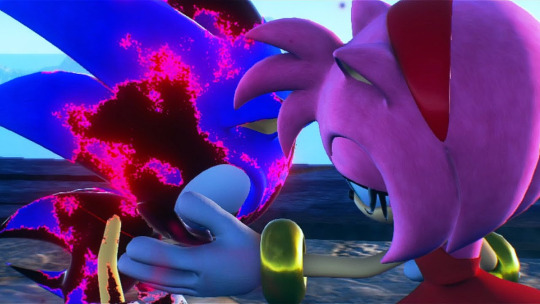
I want good story, good character, the works... what Frontier did was alright and good for being in a drought of long standing runs with no relief in a dry spell that Sonic has been trying to fight due to Sammy and other companies (watched a video on it, so much clarity!) not giving enough support to him--BUT!
Prime dives into the psyche of Sonic, and it has more emotional depth--in my humble opinion--of character-revealing moments of characters truly bonding and revealing their bond to the world, then Frontiers--which still had a nice blend--but not to the same extent.
How come?
One is a limited game with limited resources, the other was funded resources, given all the lore it could ever want and ask for, and braced itself for a narrative far longer than a few hours of skating on railings. (Not bashing gameplay, making a metaphorical 'tease' statement here.)
It's just differences.
Amy in Prime, seems more like Canon Amy's spirit, then Frontier's Amy... simply because Frontier's Amy didn't get enough screentime, presence, and greater bonding opportunities.
Prime Amys, though again, all separate and split 'pieces' are still 'pieces' nonetheless of the recognizable Amy Rose we've grown up with to love and know and love with assurity.
Yes, all of them. Because they are FOILS to Amy.
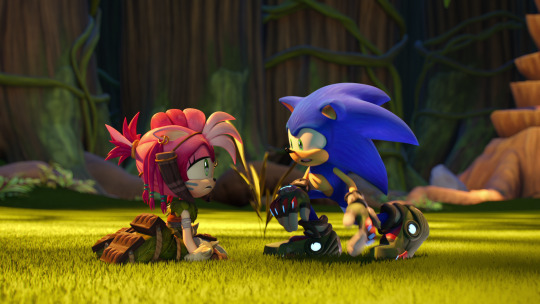
This one LITERALLY becomes Amy by the end of the episode! We just had to walk to get there, but we got there!
Does that mean Frontiers is worse or bad? No. Does that mean I hate Frontiers? No. Does that mean Prime is the supreme Sonic media in all the land? Again, no, stop that. You keep that kinda talk up, I'll lightly swat your hand and give you my best puffed-up, Amy pouty face you've ever seen! lol
Your argument, to me, is a discussion.
Is Amy portrayed as a villain? No. She's portrayed as a victim of circumstances where Sonic wasn't able to save her from becoming a damsel in distress. Is she a strong damsel in distress? Usefully, yes, because Amy's always been strong no matter what befalls or becomes her. Do they abuse that? Oh yeah! That's what makes this new idea of different versions of her so fun! She's one of the most versatile characters in Sonic media, simply because her personality, character role, and emotional motives are so much more vaster in starting plot points and meaningful, story and character driven narratives that she's one of the best dynamic writing tools to use in Sonic universes. All for Sonic's benefit? Well, yeah, that's one of her Character Roles, to reveal Sonic's 'merciful' side when it comes to fighting and destroying robots for his 'adventurous justice' streaks which I've discussed in earlier topics before.

"No. Mechanically enhanced. Survival required adaptation. As you will soon learn."
(This scene sets up Rusty Rose as "Survived on her own, used by the Eggmans, all because she was distraught because there was no such things as 'heroes' so she tried to 'save herself'." it's the tragic Damsel in Distress that tried to save herself and couldn't. In this dystopia, what a better character setup do you propose!? She's a victim who fought her own battles and--without friends--failed and so she gave in and succumbed to 'No Hope' a GREAT foil for her chara! She tried hope! It didn't work! Just made her this... able to be manipulated and controlled, losing her 'heart' in the process... quite literally...)
She does help the team reveal some of their hearts too, it's not all just for Sonic's benefit, but for the most part, that is her reason for existing in Sonic's world.
Is Amy happy-cheerful in Sonic Prime? Yeah! Until someone split a stupid Prism and made a world without Sonic's influence in it! Is Cindy the only good voice actress for Amy? I'd argue based on my own childhood experiences someone else, so it's really about preferences, and I would have to say that it's a human decision made by many factors, and doesn't define Amy's character. How can I say that? Because Amy's original voice is Japanese, and I could argue that if we want to be hyper-canon-specific, there are fans who don't even know Cindy Robinson because Amy's always had a Japanese voice actor, and doing an English one is the 'fake' one, so let's not get into semantics XDDD lolol
I agree that Frontiers has spice to her that doesn't really equal Amy to me. Amy sure has some spunk and pizzazz, but not in a confrontational way. She's too kindhearted to argue for no reason, she defends and inspires in different ways that help Sonic and the team, even bad guys go good... There are flaws in her, sure, but not to spark contrasting conflict just 'because'.

Some may argue this was done in Frontiers to give her more of a 'story arc with rising conflict' but if you're struggling that much... yikes.
Besides, Japanese dub does Amy some real cool justice in Frontiers, and I love the part in the flashback where she's trying to stop the lover from getting herself hurt as she runs into the fray for the man-chaos-looking-creature that she loves. (Which, that whole story is debunked by Sonic Adventure 1 sooooooo...)

(Sonic being a good hero bf T//^//T We stan a PROTEC scene where Sonic cares about Amy, but when she gets too emotional, can hold her through it!)
I loved that scene! It's Amy realizing how people see her actions, how she 'runs into the fray after Sonic' but begins to question whether that's really right or not. She loves love, but recklessly tossing aside life due to unspoken feelings that were too late to speak, to shy to articulate, not enough time..?
She has a 'come to the light' moment where she admits she wants to learn more, mature, and make herself someone that Sonic can respect (In Japanese, which is a really good rewriting in my humble opinion of the original English written script.)
And to agree with you, Sonic DOES support Amy in seeing that sometimes, her actions and views on love are a little exaggerated and skewed, leading him to reach out and show his consideration of her by not calling her 'foolish' or 'reckless' but instead stating that he's excited to hear all about her adventure when she gets back.

He also has some unspoken things, but until Amy learns the difference between real love and fictional exaggerations taught to people who 'dramatically' view love, she may never be able to understand how much he truly does care about her... because she wouldn't view his 'subtle realism' as how someone 'madly, deeply, oh, truly in love!' would act because of her current perceptions on how love--and subsequently people in love--are like or act.
She realized that maybe, both Sonic and her friend, show and express love in different ways. That's why she's going to discover those 'different types of love', to understand Sonic and love better. This is a Coming of Age.
Frontiers needed more time in the oven, personal opinion with the respects that I'm not an authority figure on anything, and Prime could have benefited older Sonic fans by having its rating not made explicitly for younger audience's parameters, but they did good with what they could work with--with what limitations certain ratings bring.
Now, as a conclusion:
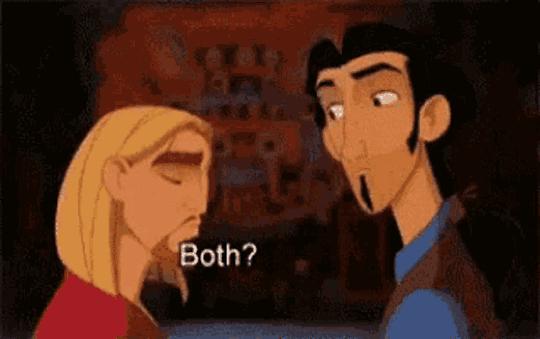
Both are good, but I prefer Prime due to having more 'story-focused' time to bake in the oven and show us characterizations with just enough time for us to bond and see the meaning in it, but I also liked Frontiers and their character moments, but wished for longer moments and less 'confusing' story elements to add to those interactions.
My Cuties, I'm your girl, Mayra. And this rant was sponsored by Anon, who is so gracious enough to donate 1 million dollars to educating Japanese Sonic fans of who the heck is Cindy Robinson! :D Love you all and goodnight! <3
#amy rose#sonic prime#sonic frontiers#cutegirlmayra#sonic#sonic rant#ask cutegirlmayra#cutegirlmayra ask
31 notes
·
View notes
Text
70. Warrior Girl Unearthed, by Angeline Boulley

Owned?: No, library Page count: 387 My summary: Perry Firekeeper-Birch is looking forward to a long summer of fishing and relaxing. But when she crashes her car (it was the bear's fault, she swears) she is forced to join her twin sister Pauline interning at a summer programme for her Ojibwe community. There, she joins reclusive museum curator Cooper in an effort to repatriate the bones and belongings of their ancestors back home where they belong. But with more Indigenous women going missing and the law tying Cooper's hands, Perry is forced to take action herself. It's a long road - but if it sees the Warrior Girl back home, it will be worth it. My rating: 5/5 My commentary:
I didn't expect to like this book as much as I did. Hear me out. There's a tendency in children's/YA books that are about a social issue to be overly preachy at the expense of the story, or to centre around that issue without nuance and in such totality that every other aspect of the narrative is drowned out. This isn't always a bad thing - I expect books for under 18s to be simpler than adult books because they are targeted to their audience - but that does hamper my enjoyment of them as an adult. This book, however, was not that. While the message of the book and the issues it was intended to highlight were obvious, the way that they were dealt with included a lot of exploration of the subject matter, and the characters and story were strong enough to carry that exploration. I found myself fully immersed in Perry's world, and learned a fair amount along the way about the Ojibwe people and culture. In a way, this book's portrayal of Ojibwe people reminded me of the Detransition Baby approach to representation. It was not there to hold your hand and lead you through the most basic of ideas, but at the same time it was accessible to someone who is less familiar with Ojibwe culture (like me). It's a delicate balance, but this book absolutely nails it.
Perry is an excellent protagonist. Rebellious, angry, boisterous, and steadfast all at once, she's exactly what I'm looking for in a YA protagonist. You can see her entire life written all over her - growing up as an Indigenous woman in modern America, with the weight of generational trauma leaning on her, carving out life and light and hope and a deep respect for her culture. She's a messy person, but that just makes her more authentic - none of the characters in this book are model minorities who are perfect and above reproach, which makes them seem more human and real. They're not treated badly by the narrative for their flaws and failings; Perry's anger, Pauline's perfectionism, Erik's criminal past. Shense the teenage mother is portrayed entirely sympathetically without an ounce of condemnation. Perry loves being Ojibwe and it's that fact that gets her into trouble often; she can't always control her mouth and her temper, and impulsively steals seeds from the collection of a white anthropologist, leading to her getting reassigned from the museum. Although much of what Perry does is breaking the law (up to and including breaking and entering to liberate the bones of her ancestors), the book never makes it feel like she is wrong, morally - sure, what she's doing is dangerous and likely to get her in trouble, but that's not the same as it being the wrong thing to do. That's the meaning of the title, really; not only is Perry looking to return the remains of a girl nicknamed 'Warrior Girl', who has been excavated and kept in a museum, she is unearthing the Warrior Girl in herself, the strength to do what must be done to repatriate her people's belongings even when it is in contradiction of the law.
This book revolves around NAGPRA, or the Native American Graves Protection and Repatriation Act, a law effective from 1990 providing for the return of remains and artifacts taken from Native American graves. The narrative is quick to condemn the shortcomings of the law. It doesn't apply to items taken before a certain date (so anything from before that is legally the property of the collection where it is held) and the item must be positively identified as part of one particular group, meaning that for artifacts whose provenance is disputed (or if unscrupulous collectors claim there's no way of telling where they came from) there is no obligation to return them. Perry clearly feels very connected to the artifacts. Shortly after learning of their trade on ebay, she makes an account and is appalled at the casual, callous way they are being sold. She understands the context the artifacts were made within, the role they played in the lives of the people who made them. To see them bought and sold as trinkets and knickknacks is crushing.
The family connection is also emphasised - Perry steals some baskets from a white collector and is able to identify them via the maker's marks and return them anonymously to their families. They aren't just baskets, they're important items made by members of the family and the community. One thing I liked about this book is that I never felt talked down to or preached to, but was helped to understand parts of Ojibwe culture and language through their casual introduction. Ojibwe language is used by most characters, and sometimes it is translated, sometimes it is left for the audience to pick up via context clues, and sometimes it is untranslated. After a while I understood a lot more than I'd started with. There's little direct exposition, instead relying on the casual introduction of these elements via Perry's narration or the reader seeing them play out. As well, there were a couple of things that were directly not explained that I thought were interesting. Perry mentions a few times that there's something she's not saying or explaining to the white curators, with the implication that it's a closed cultural practice, and it likewise isn't explained to the reader either. I like that! I don't need to pry into closed practices, but the offhanded references to them (that an Ojibwe reader would presumably understand better than I) adds further authenticity to Perry. I totally believed her as a teenager in this world, she was very real.
Another main throughline of the book was murdered and missing Indigenous women. Indigenous women are at a far higher risk of abduction and murder than their white counterparts, and a few times in the narrative Perry notes that a different person has gone missing or participates in a search. What I liked here was the complexity of the issue. Although one abductor is found and his motives explained, the narrative is quick to point out that Indigenous women go missing every day, and Perry and Pauline's precautions against being taken are presented as shrewd measures to take. In addition, the narrative notes that violence against women can happen from everywhere. Both Perry and Pauline are taken advantage of in different ways by different men, both white and Indigenous, and the author specifically notes in her afterword that she added a particular instance to the book to show Indigenous men are not exempt from being potentially abusive by their Indigeneity. The book takes pains to show that the MMIW crisis is real and has devastating effects on families and communities, which is an important thing to note.
Overall, I absolutely loved this book and cannot sing its praises more. And now I want to read Boulley's first book, just to see what that's like!
Next, an intimate look at the last few moments on death row.
4 notes
·
View notes
Text
I really like how in the season 1 finale of good omens when Crowley and Azi are disguised as one another it reflects how they are throughout the entire series. Like Azi is so easily able to mold himself into Crowley, whereas you can see hints that it’s not actually Aziraphale in heaven but instead Crowley. Crowley is firm and confident in his place in the world. He knows he’s on nobody’s side but his own and he’s so very Crowley it’s hard to mold himself into someone else, even Aziraphale. That’s why “Aziraphale” blows hell fire at the other angels and can’t help but smile as he’s being sentenced. Crowley is just too himself to be anyone else whereas Aziraphale is able to become anyone. He’s less sure about what side he’s on and is still clinging to Heaven. Because of that he’s not fully on his and Crowley’s side, and he’s not as steadfast as his partner. Aziraphale is less confident in who he is and is kind of tricking himself into believing Heaven isn’t what it’s clearly shown itself to be, so because he’s able to move swiftly between Crowley’s best friend and partner to “we’re mortal enemies and it’s just an arrangement” when he needs to(this is more so in the past and first season I noticed but it still lends to the point) Aziraphale is more able to pass off as Crowley. He’s constantly pretending around everyone except Crowley, and even then it’s spotty sometimes, so his portrayal of Crowley, while flawless and shows he clearly knows a lot about his partner still is a clear indication that Aziraphale is just not on that same level of confidence on “their side” and I feel like you can see the effects of it finally coming to a head in the season 2 finale. I don’t know it was just something I noticed on a rewatch and I thought was really interesting whether it was intentional or not
5 notes
·
View notes
Text
TW. discussion of christian morality & religion and religious themes in some detail, indoctrination, dissection & discussion of internalized and external homophobia, mentions of conversion therapy, mentions of parental illness / terminal illness, earthquake mentions, season four spoilers.
*** i would say this is mandatory reading for anyone that wants to dig in with my portrayal - all of this is extremely important to how i portray and write jason.
♱ RELIGION & JASON’S CHARACTER ARC
jason was raised as an evangelical christian. his father was a pastor at a local church. while the church was evangelical in nature, they practiced strict christian and bibilical fundamentalist values. ’fire and brimstone’ preaching was a normal occurrence for a sunday morning service, and as the son of a pastor, jason was expected to attending church twice on sundays, wednesday night prayer meetings, thursday ‘youth’ group, and spend his weekends volunteering. because of this jason was steeped in his faith for most of his young life - while he attended public school, most of the people he hung around with were like himself, christians, living according to the same ( though usually less extreme ) morals enforced by his father.
jason never questioned his faith or thought about a life outside out it in his childhood and into middle school. it was not until his mother first became ill ( around jason’s 9th birthday ) that he even questioned ‘god’s’ authority and justness. he couldn’t believe that such a faithful woman, the wife of a pastor and a loving mother would become so sick at such a young age, though he was still young enough that he didn’t grasp complex concepts as such. jason can still remember spending hours, days and weeks praying for his mother’s healing, only for her to receive a terminal diagnosis that left jason to suffer through his first crisis of faith at the tender age of nine.
through middle school, jason remained steadfast, he never really had a reason to doubt what he’d grown up learning and practicing. until he discovered BOYS. when jason was thirteen he had his first crush on a boy, and while he’d had crushes on girls before - of course - this was DIFFERENT. he knew it was wrong, he knew that his father, his friends, his god would condemn him for thinking such thoughts, but he also felt like his feelings for a boy were just as pure and love-filled as any of the crushes he’d had before, and he could not understand how it could be wrong or sinful to feel such a way.
when jason was fifteen he entered into a secret relationship with a boy. while he struggled with internal conflict constantly, he was in LOVE. he did everything he could to keep the relationship a secret - which was a heavy task in a home with such a strict code of conduct. it was right before the summer of 1985 ( right before season 3 in canon ), that jason was caught. when his father discovered he was not only in a secret relationship, but a homosexual one, he flew off the handle, harsh and swiftly disciplining jason and eventually when school was out, sending jason away to ’behavioral conversion therapy’ for the summer. ( of course his father told everyone jason had been on a mission’s trip for the summer )
TW. brief discussion of conversion therapy
jason’s time at conversion therapy was a NIGHTMARE - I WILL NOT DISCUSS SPECIFICS of this, not in this headcanon or in any thread pertaining to this part of jason’s life, but i have done research into these types of facilities and the treatment that children sent to them received, while i won’t ever talk about these events in jason’s threads, i will sometimes touch on the trauma he suffered as a result of his time there.
when jason returned from behavioral therapy, he was CHANGED. hardened and cynical. he abided by his father’s rules and his faith but internally he’d never been more conflicted. he was sure that he no longer believed in everything he’d been taught growing up, he was angry and damaged, and yet - he clung to his faith in hope of ABSOLUTION, in hopes of acceptances from his father and family and in fear of that proverbial place called hell.
♱ SEASON 4 - VOLUME 1
when the show picks up, it’s almost a year after jason’s summer in conversion therapy. outwardly he’s recovered. he’s popular, a leader, charismatic, in a happy relationship - with a woman. he is at the surface level, happy. he LOVES chrissy. he loves playing basketball. he’s held together with a smile, and pushing his way through high school, looking forward to graduating and finally getting away from hawkins. he’s already been accepted to stanford school of business - a final act of rebellion - rejecting his father’s plan for him to attend seminary school and become a pastor. his mother is still sick, but still alive and he’s still hanging onto a faith that he’s not sure he believes in.
when his girlfriend is killed in what jason - and the rest of the town - perceives to be a DEMONIC RITUAL, jason is sure it’s punishment from god being rained down. he does what he’s always done in times of turmoil, clinging to his faith and leaning in - HARD. if this is punishment from god, than it’s satan come to town, taking hold of the youth and deceiving. he’s convinced of it further when he comes across the hellfire club and the events of the season proceed. while jason is very clearly misguided, in his mind he’s on a HOLY MISSION. he’s the chosen prophet, sent by god to strike down the evil around him, he will avenge chrissy’s death and take his place fighting evil and making hawkins better for it.
the truth however, is always more complicated. jason does believe he’s on a holy mission, but there’s a DARK ANGER motivating it too. he’s always had a problem with eddie munson. he’s never been able to place it, the resentment he feels towards him. the way eddie is confident in himself despite being a total outcast, the freedom in being a freak, in not conforming to anyone or anything, the comfortability in his own skin, eddie’s refusal to bend to jason or anyone else. it’s always gotten under jason’s skin. so while he believes he’s stomping out evil, a darker, more conflicted part of himself wants to stomp out eddie and other’s like him. the type of people that make jason doubt his faith, his conditioning…his sexuality…
♱ POST SEASON 4
( jason survives - canon divergence ) once jason awakes from his coma - paralyzed from the waist down, his torso covered in burns and a hazy memory at best of exactly what happened the night of the earthquakes. he’s shaken, to his core. up until the very end, jason had been sure that he was on a holy mission - to avenge chrissy’s death. when he’d seen max, in that attic, floating above the ground, he’d been desperate to save her, he’d failed. only once the dust settled and the holy wrath of god had rained down on the town of hawkins, suddenly he was unsure of what it all meant. innocent lives had been lost, and jason hadn’t saved anyone, if anything he’d hurt people. max, lucas, even eddie munson - now presumed dead, and accused of a murder that jason was no longer sure he could have possibly committed.
it takes time, days, weeks and months after the earthquakes and jason’s starting to look back on his life, on the faith of his father and question it. in that time, jason’s body hasn’t made much progress, and he’s spent his time trying to help the community mourn and rebuild, while trying to come to terms with himself, his failures and mistakes, and his growing lack of faith in a god that he’s not even sure exists anymore. of course, this is all internal, since the events, he’s become somewhat of a beacon for those still practicing in the faith, a symbol of their faith that he’s slowly rejecting and it’s both an immense burden and feeling of guilt that’s settled over him. he’s ashamed, scared and desperately trying to make amends, while mourning the loss of his girlfriend and friends.
ultimately, jason will reject christianity entirely. though it will take years and decades to come to break down, unlearn and deconstruct the world he’s been so steeped in for his entire life. the process will be slow, painful and not without relapse, guilty and fear will be a driving force in keeping jason from outwardly expressing his new found cynicism and healing from the trauma of a lifelong indoctrination, but he’ll get there…with time.
0 notes
Text
Book Title: 𝐒𝐞𝐩𝐭𝐞𝐦𝐛𝐞𝐫 𝐑𝐨𝐚𝐝
By Pax Sinclair
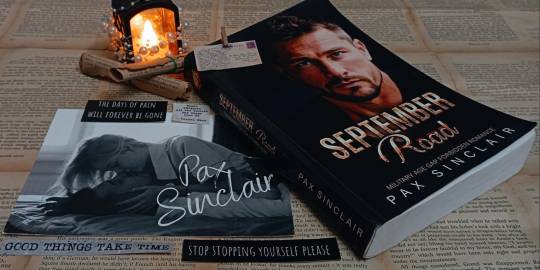
𝐒𝐮𝐦𝐦𝐚𝐫𝐲:
I’m a former Army Ranger, an Afghan vet that’s faced my share of battles, but nothing in my training has prepared me for the road trip I’m about to take alone with Riley, the daughter of my best buddy.
Josh and I grew up in a Vermont small town. We joined the Army after high school and we busted our asses to become Rangers. I’ll never forget the night he died on a mission in Afghanistan, leaving behind his young daughter Riley and his wife, Laci.
Years later, when Laci died, it became my duty to fulfill her final wish, to drive her daughter from New Mexico to Vermont to Josh’s mother, the only family Riley has left. While I take Riley to her grandmother, I’m to tell her about a father she doesn’t know and the harder memories of how Josh and Laci’s lives intertwined with mine.
Riley is a 20-year-old smoking hot beauty with sass, determination, and she won’t back down, especially from me. And yeah, she’s my type. Damn, she's more than just a temptation, she’s my best buddy's daughter. I know where my duty lies, so this brown-eyed girl is off limits.
I have to be honest with myself; there's no point in sugarcoating this situation. What could that princess see in a 40-year-old soldier still battling his own demons? Being in close quarters on a long road trip with her will be challenging enough, but staying true to my loyalty to Josh and protecting his daughter, even from my own feelings, will be the real test. I can do it. I can be a hard ass and complete the mission, but damn, she’s beautiful.
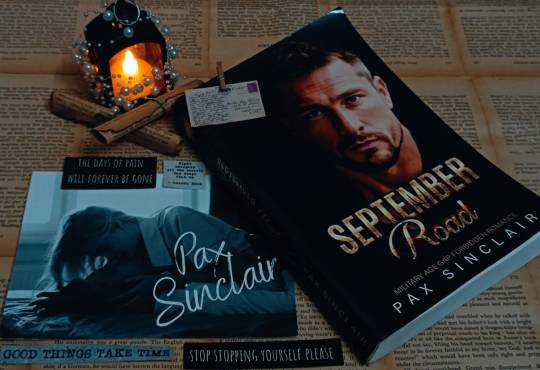
𝐑𝐞𝐯𝐢𝐞𝐰:
The story deals with loss, grief, forgiveness, friendship, and an age- gap forbidden all-consuming love.
Riley is a great character, so strong after all she's been through a lot but determined to live. She was smart, funny, but a risk taker. When Riley meets Stephens, sparks fly. The romance is top notch in the beginning when they both don't know each other.
Later when Bank came to know that Riley's Josh kid and he's supposed to take her to Josh's mother house in Vermont,everything changes. He denies the fact that he wants her. He totally turns her down. But how long can he hold out? The harder they protest the better it is when they fall.
Those first few chapters were slow but the interaction between Riley and Banks left me with an open jaw and I was sold. I just had to find out what would happen next. Lots of things happen and it is a good lengthy book. There are nice steamy scenes, humour and a great group of secondary characters, especially Max Stephens and Riley's grandmother and Creed (Riley's Ex boyfriend). The brotherhood between Josh and Banks Stephens explained well.
This story takes us far past the exciting beginning of Stephens relationship with Riley's parents. I loved their story. There is also an incident that happens toward 3/4 of the way in the book that had me sobbing and going through the emotions with the characters.
From the extremely hot scenes, to the great portrayal of military men and the women who love them, it was perfect. The writing is phenomenal. I was completely captivated with each introduction of the individual characters.
Their relationship is not without its ups and downs, being far from perfect, but I loved it. They both seemed so right in their stubborn steadfastness to what they wanted and needed, and even when they were at odds you wanted them to win, to make it work. I found the last half of the book excruciating, it broke my heart more than once, leaving me with ugly cries and in despair.
The characters pull you in and eventually drag you along with them whether you want to go or not. I could not put this book down and had to finish it in one reading. Who needs to sleep when you have characters keeping you awake?
I loved the chemistry between Banks and Riley. Their bantering throughout the road trip was really funny and they were so good together. When they finally got together in all ways it was off the charts. But I also love the other relationships in this book.
I loved the humor & the emotions within, I loved the characters and most of all, I loved the letters. Great secondary characters and I would read their stories if Pax chooses to write about them. Definitely one of the best books I've read so far this year.
𝐑𝐚𝐭𝐢𝐧𝐠 : 10/10
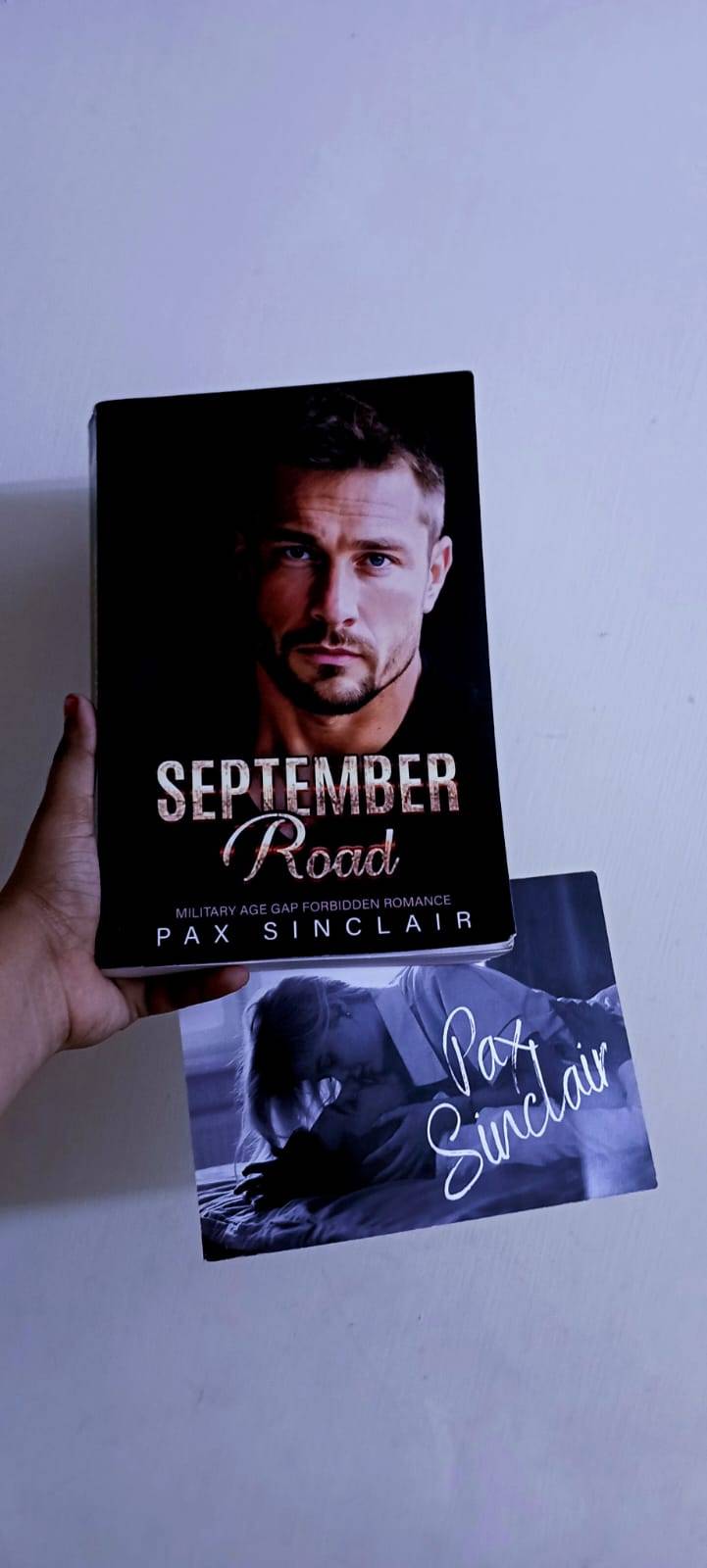
𝐀𝐛𝐨𝐮𝐭 𝐓𝐡𝐞 𝐀𝐮𝐭𝐡𝐨𝐫:
Pax Sinclair is a contemporary romance novelist who explores the wild world of love and passion. Her novels feature biracial women in interracial relationships, guaranteed to keep you turning pages until the very end.
Prepare to meet a tantalizing cast of characters, from sizzling tech billionaires to swoon-worthy firefighters, hunky men in kilts, and even a hot Army Ranger.
Lose yourself in a steamy rollercoaster ride of emotions and crazy twists, leading to an oh-so-satisfying conclusion.
0 notes
Text
Western Youth Turn To Islam, Inspired By Palestinians' Faith in Allah (God)
The resilience shown by the people of Gaza during the five-month-long bloody war has ignited curiosity about Islam among young people in the West, leading many to embrace Islam.
— Ayse Betul Aytekin | TRT World | Thursday March 21, 2024
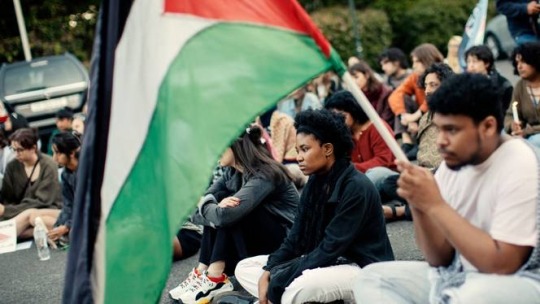
Young people in the West are now keen to freely explore historical conflicts with easy access to information. / Photo: Getty Images. Getty Images
Young people in the West are now keen to freely explore historical conflicts with easy access to information. / Photo: Getty Images
A Palestinian woman sits on the ground, embracing her deceased toddler who's draped in a white sheet. Tears stream down her face as she silently cries and murmurs the word "alhamdulillah," a humble acknowledgement in Arabic that Muslims use to express gratitude and thankfulness to God regardless of difficult circumstances they may be encountering.
That expression of faith touched millions of viewers on social media, even resulting in life-changing decisions for some. And the 25-year-old Abbey Hafez, who’s married to a Muslim man and identified herself as a Christian, was one of them.
The American social media influencer began reading the Quran after watching this video and being captivated by the Palestinian mother's devotion. Sharing her story in an interview, she said, "I need to read this book and see what it is that they believe in to be this steadfast in their faith."
Like Hafez, whose videos have garnered over 35 million views online, there’s a widespread trend across Western countries where people are taking a keen interest in knowing Islam beyond its stereotypical portrayal peddled by mainstream media for decades.
From famous celebrities to activists with millions of followers, the trend of individuals announcing their decision to embrace Islam or, at the very least, start reading the Quran has become increasingly common on social media since October 7.
Examples include Henry Klassen, a renowned ophthalmology professor at the University of California, and former Spanish football player Jose Ignacio Peleterio converting to Islam. Hollywood star Will Smith has also expressed his interest in reading the Quran. In another instance, at least 30 women announced their conversion to Islam in Melbourne, Australia, deeply moved by witnessing the strong faith of Palestinians.
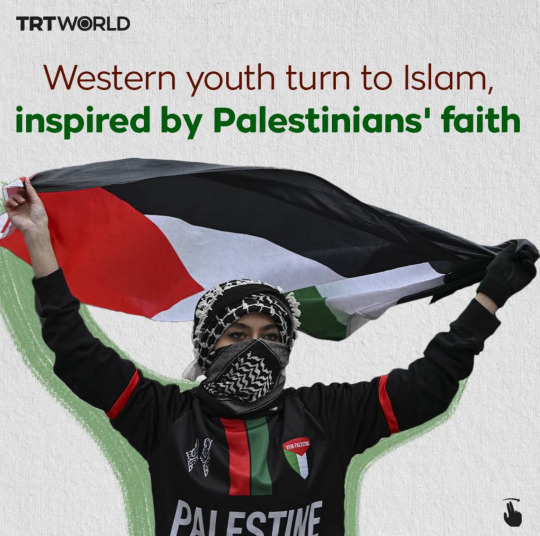
The Snowball Effect
Feelings of solidarity, empathy or sympathy with Palestinians might contribute to the wish to learn more about their background and faith, Dr Vanessa Vroon of Social and Behavioural Sciences at University of Amsterdam explains.
Once people start to educate themselves about Islam, they often realise that “it is different from what they learn from the often negative media coverage of Islam in Western countries,” she tells TRT World.
When asked about what might be the political roots and implications of these conversions, Vroon says, “Politics are known to play a role in so far as people ask themselves: is Islam really that bad?”
“What might make a difference in light of the Palestine-Israel conflict is that in the news, day in day out, people see that amidst the devastation of war, Palestinians turn to Allah for help and strength. This, again, might be a first impetus to start learning more about their religion, possibly become convinced of its truth and consider becoming Muslim oneself,” she adds.
A young American woman, Megan Rice, was among the pioneers in sharing her exploration of Islam online, inspired by the Palestinian people. She began posting videos discussing her journey into Islam, particularly after purchasing the Quran, which garnered interest from her followers, prompting them to consider buying the holy book themselves.
While interacting with her followers and responding to their queries largely about her learning of the Quran, Rice established a digital book club where people could exchange thoughts and interpretations of Quranic passages. The number of Western individuals who have begun reading the Quran and sharing numerous videos detailing their positive and enriching experiences has thus increased over the months.
Megan's journey experienced a profound transformation as she evolved from being influenced by others to becoming an influencer herself, assuming the role of an initiator within her newfound community after her conversion to Islam. Now, she actively continues her social media activism by spearheading various campaigns.
The new young social media users aren’t just bold enough to reject Western states’ blind support for every Israeli action, challenge media biases, and seek truth through independent research; they also aimed to inspire others to join their quest for a more nuanced understanding of the colonial occupation.
Another American woman, 32-year-old author and content designer Kaitlyn Luckow, currently residing in Germany, launched a BookTok series—a type of content on TikTok where users share, discuss, and review books—after October 7 to impart knowledge on the history of Palestine.
“I knew I had to use the platform I had –regardless of how small it may be– to share learnings, resources, and books. I don’t know everything and I’m learning every single day. And if I can encourage others to do the same, then maybe we can collectively demand and create systemic change,” she told TRT World.
People around the world, especially the youth, are starting to open their eyes and educate themselves, Luckow believes, as they go on social media every day and watch as innocent humans are being murdered while their governments try to convince them that this is the right thing to do to protect their own interests.
Despite receiving numerous hateful comments every day, she remains determined to encourage people to question mainstream media narratives and embark on their own journeys of learning about pressing issues.
“While I am under no illusion that I am going to change someone's opinion immediately, I am hopeful that maybe I can help plant a seed of doubt regarding the information they are receiving and how to become more media literate,” she says.
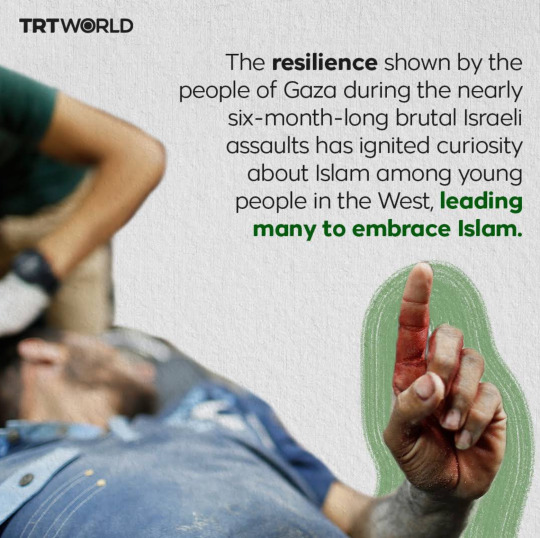
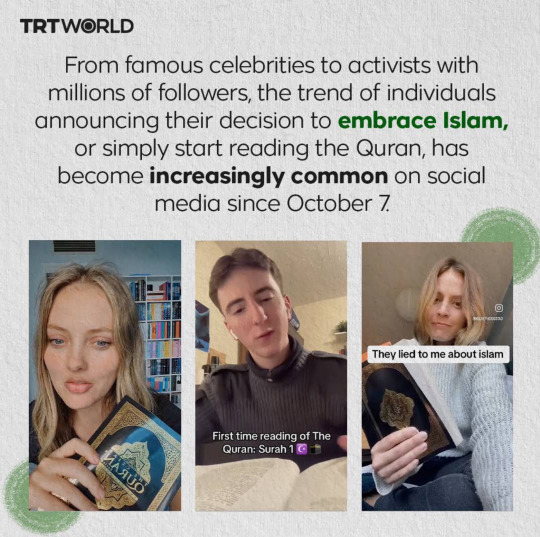
TikTok Says It All
Experts say that 2014 was a pivotal year in shaping a new generation's understanding of the Israeli-Palestinian conflict. During that year, a war in Gaza resulted in the deaths of over 2,250 Palestinians, coinciding with protests erupting in the US when the police shot Michael Brown, an unarmed 18-year-old black man.
The global youth’s opinion on Palestine took on a new dimension also when the Sheikh Jarrah neighbourhood in Jerusalem witnessed settler occupation in May 2021. It marked the first time Palestinians, whose homes were occupied, could share detailed accounts of the Israeli occupation as it unfolded, thanks to Instagram's live-streaming feature. Notably, these accounts went viral, and people watched Israeli forces trying to expel the el-Kurd family from their homes for weeks.
Following these events, with TikTok surpassing Google in website visits in 2022 and experiencing the fastest growth to over a billion users among all social media apps, the collective memory of Palestine among the youth in the West began to take shape.
Right after the October 7 attack, a wave of online self-education has unfolded as TikTok users started posting videos inviting open discussions about the ongoing conflict, leading to many conversations delving into the history of Israeli occupation.
From October 16th to 30th, there were nearly four times as many views organically on TikTok posts with the hashtag #StandwithPalestine globally as there were on posts with the hashtag #StandwithIsrael, the Chinese app announced, in response to the accusations that it was pushing pro-Palestine videos deliberately, subtly influencing the youth of America.
The millennials and Gen-Z, who are the primary users of the app, are more aware that the Israel-Palestine conflict did not originate on October 7th. A recent survey indicates a notable generational difference in the American perspective on support for either Israel or Palestine, with younger generations showing a more pronounced pro-Palestine stance and increased scrutiny of US policies regarding the conflict.
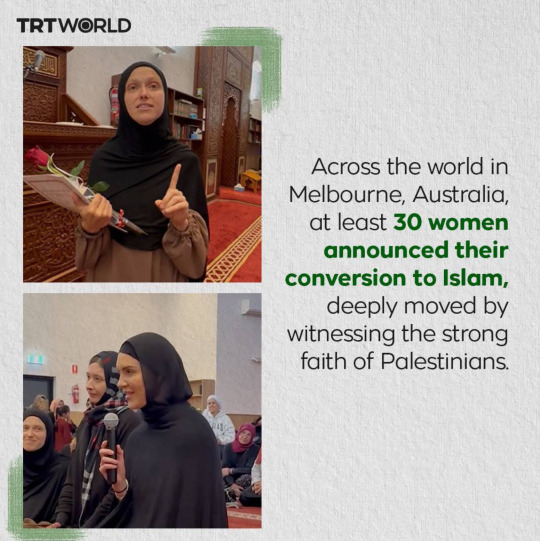
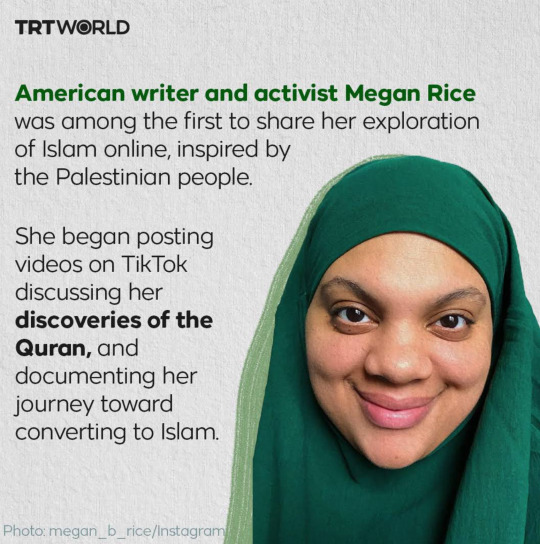
The Counter-Effect
While TikTok and its young users remain a notable aspect of West-Islam interaction, the phenomenon of increased interest in Islam following catastrophes in the Muslim world is nothing new.
The September 11 attacks in 2001 marked the initial exposure to Islam for many Westerners, initiating a transformation. This shift has led to significant growth in the Muslim population in the United States, with numbers increasing from an estimated 1 million to 2.6 million between 2000 and 2010—a 67 percent surge—making Islam the second-largest religious group in the country and the fastest-growing religion in the world.
People who then first learned about this religion and began exploring it out of curiosity often mention experiencing a significant shift in mindset after realising that the religion stands in stark contrast to the extremist ideologies acclaimed by those responsible for the attacks.
“From September 11 onwards, you couldn't find a single newspaper in the United States that did not mention the words "Islam" and "Muslims" daily or weekly for years, and it has obviously had consequences,” says Wilfredo Amr Ruiz, the Communications Director of the Council on American-Islamic Relations (CAIR) Florida.
He mentions that it was in the early 2000s when pioneering academic institutions around the world began conducting studies on fields such as Islamic studies, Muslims civilizational studies, and Christian-Muslim relations.
"Whenever Muslims are portrayed, whether positively or negatively, people become curious about who Muslims are and what Islam entails. By placing Muslims in the forefront, regardless of the intent behind it, people will inevitably learn from them. Whether Muslims are showcased to speak the truth about their beliefs and actions or being simply vilified, it will inevitably yield consequences and individuals will become intrigued," he tells TRT World.
Ruiz, who himself reverted in 2003, a couple of years following the 9/11 attacks, believes that another consequence of the increasing Islamophobia in the US following the crisis in Iraq, Afghanistan and the Arab-Israeli war was that Muslims became more vigilant against discrimination and endeavoured to educate themselves about their rights.
— Source: TRT World 🌎
#Islam ☪️#True Religion of Allah#Forever Palestine 🇵🇸#Palestinians’ Faith in Allah (God)#Western Youth | Converted to Islam ☪️#TRT World 🌎#News 🗞️
0 notes